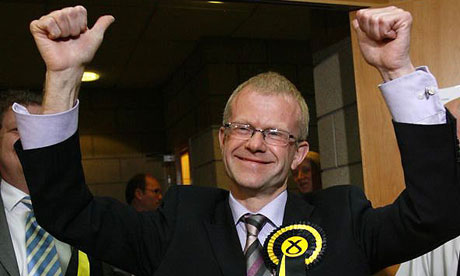I read David Jones' blog this morning with incredulity. Not so much the story in the Telegraph—that Gordon Brown is thinking of bringing the LibDems into government—but at the complete naïvety of his argument.
His logic is that the polls now show the Tories at 40%, Labour at 22% and the LibDems at 25%. If there were a general election now, the LibDems would gain an extra 15 seats ... so why on earth would they prop up the current government?
The answer is simple, and is contained in what David Jones wrote: those percentages would mean (and Electoral Calculus might be wrong, but not so far out) that the Tories get 376 seats, Labour 161 and the LibDems 82. I'll put it in a table:
Con ... 40% of vote ... 58.2% of seats
Lab ... 22% of vote ... 24.9% of seats
LDs ... 25% of vote ... 12.7% of seats
I hope that makes things as obvious to the MP for Clwyd West as they will be to everyone else. That sort of distribution of seats is a political obscenity worthy of a banana republic.
-
Put yourself in Nick Clegg's position (or that of any other LibDem or Liberal leader in the last 80 years) ... what will 15 additional seats in an immediate general election give him in terms of political influence? Absolutely nothing. The Tories will sit pretty on an undeserved overall majority, and what all the other parties do or say will be quite irrelevant. 25% of the vote means that the LibDems should get roughly 162 seats, 100 more than they won in 2005 ... yet David Jones wants them to be happy with an extra 15.
No, David Jones is not that naïve. He's poo-pooing the idea because he wants his party to have an artificial, undeserved majority. Though, to be fair, Labour have been just as guilty of the same thing in the past.
-
OK, let's look at the Telegraph's story in a bit more detail. It is only a "rumour mill" piece; no names, no sources. It might be more fancy than fact. But anyway:
MPs' expenses: Gordon Brown considers Lib-Dem deal in 'reshaping’ reshuffle
... it has emerged that senior Cabinet allies are urging [Gordon Brown] to deliver a “game-changing” reshuffle in the aftermath of next week’s local and European elections.
One Cabinet minister said last night: “We have to be looking at reshaping the whole Government and not just a simple reshuffle of the Cabinet that rarely means anything to the wider public.”
The expenses scandal has brought constitutional reform back to the top of the political agenda. It is understood that a sizeable number of the Cabinet—possibly as many as half—favour a new voting system, with the single transferable vote form of proportional representation very popular.
Any move to involve the Liberal Democrats would be treated warily by some close advisers to Mr Brown, but he is being urged to think boldly to try to recapture the political initiative.
One radical idea would be to bring senior Liberal Democrat MPs into Government, the most obvious being Vince Cable. That would involve a series of deals behind the scenes involving Nick Clegg, the Liberal Democrat leader. Last night Labour sources suggested that any such deals were still a long way off.
The key statement is that "a sizeable number of the Cabinet—possibly as many as half—favour a new voting system." Electoral reform must be the bottom line for the LibDems to have anything to do with this Labour government.
I commented on Alan Johnson's call for electoral reform in this post on Monday, so I won't go into the reasons why I am in favour of PR again here. I'd perhaps only re-iterate that, even though I support STV rather than AV+, I think it might be asking too much to get STV through in less than a year ... which is all the time this government has left.
From Labour's point of view things are going to look very bleak when the European Parliament results come out on Sunday. The Tories will of course howl for the Prime Minister to call an election straight away. He has got to resist these calls ... and I am sure he will, because he has shown himself to be nothing if not stubborn. Labour still have a large enough majority to survive until May 2010, and they would be fools not to. But Labour do have to do something, and a reshuffle will not be enough.
From the LibDems point of view, they have got to avoid being suckered in without any firm commitment to change the electoral system. I think they should only play ball if Labour commit themselves now to a binding (not consultative) referendum on electoral reform before May next year. That still leaves open the possibility of negotiating to present a number of choices in that referendum, and there would be nothing wrong with having a two stage referendum: one to narrow down the alternatives, then a final one to decide which of two most favoured options we should adopt.
Of course there is nothing to stop a range of other changes. Fixed term parliaments seem to have support even from the Tories, so there is probably no need to include that in a referendum.
-
The UK has just under a year to change the way Westminster works, because once the Tories are in we will only get a few cosmetic changes centred around procedures and practices. But the only change that ultimately matters is that the number of bums on seats fairly reflects the way that people voted ... only then can Westminster claim to be a representative democracy.













